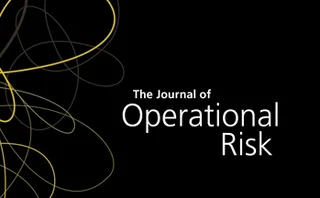Technical paper/Model risk
Operational risk, capital regulation and model risk
The author proposes seven basic properties for operational risk modelling to form an operational risk management framework.
A new automated model validation tool for financial institutions
The authors put forward a novel automated validation tool, based on US Federal Reserve and Office of the Comptroller of the Currency regulatory guidance, which is used to to validate predictive models for financial organizations.
Bayesian backtesting for counterparty risk models
Utilising Bayesian methods, the authors put forward a new means for counterparty risk model backtesting which is both simple to implement and conceptually sound.
Model risk in mortality-linked contingent claims pricing
The authors investigate the influence of model risk on pricing life products and demonstrate that classical Lee-Carter-type models can be less accurate than the proposed model.
Quantification of model risk with an application to probability of default estimation and stress testing for a large corporate portfolio
This paper discusses the building of obligor-level rather than segment-level hazard rate corporate probability of default models for stress testing.
Model risk quantification based on relative entropy
This paper proposes a minimum relative entropy technique for challenging derivatives pricing models that can also assess the model risk of a target portfolio.
Can we take the “stress” out of stress testing? Applications of generalized structural equation modeling to consumer finance
This paper provides a practical introduction to the GSEM statistical framework in risk management, and it illustrates the game-changing potential of this methodology with two empirical applications.
Correlations in operational risk stress testing: use and abuse
The paper presents an analysis of correlation effects of economic factors on the operational risk losses of a medium-large UK retail bank, and it recommends that causal factors that effect operational risk should be identified.
A Darwinian theory of model risk
An ex ante methodology is proposed to analyse the model risk pattern for a broad class of structures
Statistical properties of the population stability index
This paper aims to fill a gap in the literature by providing statistical properties of the population stability index (PSI) and some recommendations on its use.
Hypothetical yield curve scenarios for credit stress testing
In this paper, we discuss a set of hypothetical yield curve shift scenarios generated by applying extreme value distributions and a shaping procedure. These statistically derived hypothetical stress scenarios could be susceptible to model risk, leading…
A k-means++-improved radial basis function neural network model for corporate financial crisis early warning: an empirical model validation for Chinese listed companies
This paper aims to simplify the early warning model for financial crises by collecting and analyzing the financial data of Chinese special treatment (ST) companies, normally listed companies and cancel special treatment (CST) companies.
Benchmarking operational risk stress testing models
This paper outlines several approaches to benchmarking operational loss projections under stressed scenarios using both accounting metrics and historical loss experience.
An emergent taxonomy for operational risk: capturing the wisdom of crowds
In this paper, the author takes a data-driven approach and combines the individual active taxonomies of sixty large financial institutions (fifty-eight for construction and two for validation) to create a coherent new reference taxonomy: the ORX…
Quantification of the estimation risk inherent in loss distribution approach models
In this paper, the authors contribute to the measurement of model risk by focusing on the quantification of estimation risk.
Model risk management: from epistemology to corporate governance
In this paper, the authors conduct an analysis of model risk in an attempt to understand the main issues that lead to failures and the best way to address such issues.
Model risk tiering: an exploration of industry practices and principles
This paper seeks to shed light on one critical area of such frameworks: model risk tiering, or the rating of risk inherent in the use of individual models, which can benefit a firm’s resource allocation and overall risk management capabilities.
A new approach to the quantification of model risk for practitioners
This paper's aim is twofold: to introduce a mathematical framework that is sufficiently general and sound to cover the main areas of model risk, and to illustrate how a practitioner can identify the relevant abstract concepts and put them to work.
Quantification of model risk in stress testing and scenario analysis
In this paper, the author's aim is to empirically analyze the numerical quantification of model risk, yielding exact buffers in currency amounts (for a given model uncertainty).
Procyclicality of capital and portfolio segmentation in the advanced internal ratings-based framework: an application to mortgage portfolios
This paper investigates the procyclicality of capital in the advanced internal ratings based (A-IRB) Basel approach for retail portfolios, and identifies the fundamental assumptions required for stable A-IRB risk weights over the economic cycle.
Bermudan swaption model risk analysis: a local volatility approach
This paper seeks to contribute a simple and (almost) model-free way of assessing the economic value of the Bermudan exercise right derived from a “minimal” local volatility enhanced interest rate model.



